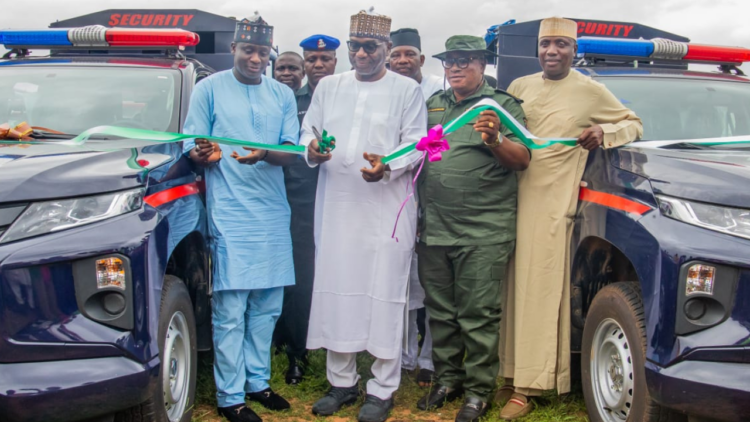By Omotayo Ayanda
In a resolute response to the rising security concerns, particularly the alarming increase in kidnapping incidents in Kwara South, Governor AbdulRahman AbdulRazaq’s initiative to donate patrol vehicles to the police is a pivotal step towards fortifying public safety. However, as the state grapples with this multifaceted security challenge, it becomes evident that a comprehensive strategy involving sustained commitment, active community cooperation, and more extensive measures is required to effectively address and curb this threat.
Governor AbdulRazaq’s gesture of providing patrol vehicles to the police force is undeniably commendable. These vehicles equip law enforcement personnel with enhanced mobility and resources, enabling them to respond swiftly to emergencies. A visible reminder of the government’s commitment to the welfare of its citizens, these patrol vehicles symbolize a promise of protection. Nevertheless, it is crucial to acknowledge that while these tangible assets contribute to crime prevention, they cannot single-handedly eradicate the root causes of kidnapping or prevent its recurrence.
To achieve enduring results, a collaborative synergy among law enforcement agencies, governmental bodies, and local communities is indispensable. The police force must demonstrate unwavering dedication by actively engaging in intelligence gathering, proactive patrolling, and effective communication. It is through the collective efforts of a steadfast and determined police force that a sense of security can be restored, and criminal activities can be deterred effectively.
At the heart of an effective anti-kidnapping strategy lies community cooperation. The local population serves as invaluable partners in the fight against crime, acting as vigilant eyes and ears for law enforcement. Encouraging citizens to report suspicious activities, share crucial information, and actively collaborate with security agencies forms a critical pillar in the prevention and resolution of crimes. Establishing a foundation of trust between the police and the community further enhances the efficacy of crime-fighting endeavors.
The governor’s proactive approach to enhancing security also extends beyond the donation of patrol vehicles. During the event held at the Government House in Ilorin, Governor AbdulRazaq unveiled a comprehensive plan to bolster safety measures across the state. The allocation of 32 patrol vehicles and 160 motorcycles to 16 local government areas (LGAs) underscores the administration’s commitment to forging collaborative partnerships with local councils and security agencies. This concerted effort is aimed at safeguarding residents, especially in remote areas where the threat of criminal activities is pronounced.
The recent incident in Isanlu-Isin, Isin Local Government Area of the State, where individuals were kidnapped, serves as a stark reminder of the urgent need for enhanced security measures. By strategically positioning patrol vehicles and motorcycles within LGAs, Governor AbdulRazaq endeavors to fortify local security infrastructure and empower communities to actively engage with law enforcement agencies in tackling security threats.
The chairman of the Association of Local Governments of Nigeria (ALGON) and Ifelodun local government chairman, Jide Ashonibare, expressed appreciation for the governor’s foresight. He affirmed the commitment of local authorities to ensure the judicious use of the provided resources, ultimately strengthening security and protecting residents.
As Kwara State embarks on a path to prioritize the safety and well-being of its citizens, the distribution of patrol vehicles and motorcycles stands as a beacon of hope. Collaborative efforts between the government, local authorities, and security agencies offer a promising outlook for a more secure future. However, the journey towards comprehensive security necessitates a multi-pronged approach.
In addition to physical resources, investing in advanced technology such as surveillance cameras and communication systems can amplify law enforcement’s capabilities. Addressing the root causes of criminal activities through initiatives targeting unemployment and education gaps is also integral to long-term crime prevention.
Governor AbdulRazaq’s actions lay the foundation for a safer Kwara, but achieving complete security demands ongoing and united efforts. To effectively combat kidnapping, a cohesive collaboration between the government, law enforcement agencies, and local communities is imperative. Through collective determination, shared responsibility, and a holistic strategy, Kwara can overcome this challenge and emerge as a beacon of security and prosperity for the entire state.
In this collective endeavor, it is crucial to recognize that security is not solely the concern of the government or law enforcement agencies. Rather, it is a shared responsibility that requires active participation from every citizen. By uniting efforts, Kwara can surmount its security challenges and pave the way for a brighter, more secure future for all residents.
